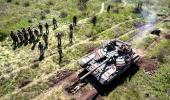The Ukrainian Air Force on Thursday said that Russia launched a massive missile attack on the city of Dnipro, involving intercontinental ballistic missile (ICBM).

It further reported that the attack involved a range of missiles, including an intercontinental ballistic missile launched from the Astrakhan region of Russia, a Kh-47M2 'Kinzhal' aeroballistic missile fired from a MiG-31K fighter jet in the Tambov region, and seven Kh-101 cruise missiles fired from Tu-95MS strategic bombers in the Volgograd region.
In a statement on telegram channel, the Ukrainian Air Force wrote, 'On the morning of November 21, 2024, between 05:00 and 07:00, Russian troops attacked the city of Dnipro (enterprises and critical infrastructure) with missiles of various types.'
It added, 'In particular, an intercontinental ballistic missile was launched from the Astrakhan region of the Russian Federation, an Kh-47M2 'Kinzhal' aeroballistic missile from a MiG-31K fighter jet was launched from the Tambov region, seven Kh-101 cruise missiles were fired from Tu-95MS strategic bombers (launch area - Volgograd region).'
The Ukrainian Air Force further said that as a result of anti-aircraft combat, units of anti-aircraft missile forces destroyed six Kh-101 missiles.
It further informed that information about victims has not yet been received.
'Once again, we ask citizens not to delay with air warning signals! And we call on all media people and bloggers to responsibly spread this or that information about the combat work of the Armed Forces of Ukraine and any threats to the Ukrainian state,' the Air Force said.
Notably, an intercontinental ballistic missile (ICBM) is a long-range weapon that is fired into space and then releases a warhead or warheads that reenter the atmosphere to drop on their targets.
They are considered to have a minimum range of 5,500 kilometres (3,400 miles), but some versions can go much farther, more than 9,000 kilometres, according to the Center for Arms Control and Non-Proliferation.
The first ICBM rocket was launched in 1957 by the then-Soviet Union, followed by the United States in 1959.
Meanwhile, the United States on Wednesday confirmed that it will provide Ukraine with non-persistent anti-personnel landmines to aid in the country's defence against Russian attacks.
The US State Department spokesperson Matthew Miller said that the decision to provide anti-personnel landmines is a response to Russia's military advances in eastern Ukraine.
Notably, there were news reports that US President Joe Biden authorised the provision of anti-personnel landmines to Ukraine.
Addressing the US State Department press briefing on Wednesday, Miller said, "So I can confirm that we are providing the Ukrainian government with non-persistent anti-personnel landmines. We have been providing them with anti-tank landmines for some time, but this is the first time we are providing them with anti-personnel landmines."
He added, "There are a few things that I think are important to note about this new provision of equipment to the Ukrainians. One is that, as you have heard the Secretary say many times, we always adapt and adjust our policies based on real-world events. And the real-world events that we have seen are Russian advances, specifically Russian infantry advances in eastern Ukraine, and these non-persistent anti-personnel landmines are designed to blunt those types of infantry advances. They are very different from the landmines that the Russians have deployed and that you have seen other militaries, including our own military, deploy decades ago."











 © 2025
© 2025